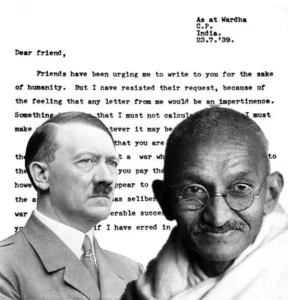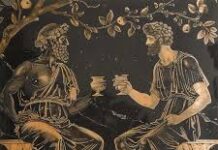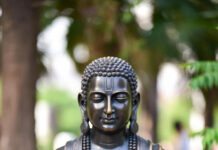
Dear Jeyamohan,
Do you believe that the Gandhian approach can win over somebody like Hitler? If all the countries hadn’t united and killed Hitler, could we have defeated him? Also, it is acceptable that Gandhi organized the people. But was he the one who brought us freedom? The British government of that time gave up its colonial policy. Was it not the reason?
Regards,
Prabhu
Dear Prabhu,
There is no doubt about the sort of politics you have read: the worthless history written by our immature Marxists. Please reconsider this. Otherwise, you will soon start considering yourself an elite intellectual. You will start establishing yourself in a grand position, above crores of other people, discarding their wishes, dreams, history and culture. You will consider yourself as an emancipator of ordinary people and someone entrusted with the responsibility of guiding other people. That is the ugliest spot for a thinker to ever reach.

Once you stand on that spot, you gain a fabulous authority. You are not one of the common masses anymore. You are an evolved life form which can be tired of the stupidity of common people – ‘Our people have no sense!’. You can abuse crores of people that they prostitute themselves for money, as nitwits concerned solely about food. Given a chance, you could take people along as you decide, at the point of a gun. For their own sake, you can involve them in any war. You can kill and destroy them for the sake of their own future. Like Hitler, Stalin, Mao, Pol Pot and Kim Il-sung did.
After that, they remain people only as long as they obey your orders, live as examples of your principles and transform as mice for your experiments. Otherwise, they can be put to death. I am reminded of a poem I read several years ago –
The Solution – Bertolt Brecht(1)
After the uprising of the 17th of June
The Secretary of the Writers’ Union
Had leaflets distributed in the Stalinallee
Stating that the people
Had forfeited the confidence of the government
And could win it back only
By redoubled efforts. Would it not be easier
In that case for the government
To dissolve the people
And elect another?
I wrote this to drive home the gigantic flaw in the history that you mentioned. What we call history is comprised of people. Crores and crores of them. Their wishes, desires, strengths and weaknesses put together make history move forward. One who organizes the people and takes them forward, takes history forward. ‘Gandhi organized people, but history happened on its own’ – how can you make this statement?

To understand the Indian freedom struggle, you should understand the Indian social structure atleast a bit. India didn’t have a legacy of common people directly participating in politics. This is because, what existed here was monarchy. In India, the only authority that controlled the kings was tradition. People had an indirect authority over the kings in the sense that they constituted tradition – that was all. The concept of democracy originated in Europe as a result of two hundred years of tumultuous thought.
In the 17th century, the British people came when India didn’t have strong governments and when it was left devastated by invasions. They provided a stable government, law and order and a better administration of justice. Hence, a majority of Indian people accepted British rule. A large segment of the population remained loyal to their kings. Those kings remained loyal to the British. The reason why the British ruled India was because this great nation accepted the British entirely.
In the beginning, only a few realized that the hidden exploitation of the British government was impoverishing the country. Most of the early rebellions against British rule were against their excessive taxation policies. Kattabomman, Pazhasiraja, Veluthambi Thalavaai, Alluri Seetharama Raju… were all subdued.
Later, an educated class came up in India which understood the British exploitation intellectually. The great Bengal Famine and others became obvious evidence of the same. Concepts of freedom and self-governance came up. But they all remained in the midst of a few middle class educated people.
The man who took those concepts to crores and crores of Indians was Gandhi. His movements were aimed at making the hidden exploitation of the British, blatant and obvious. Boycotting foreign cloth, preparing salt and other movements – these exposed the economic extortion underneath the skin-deep justice of the British government. He made crores of people participate in those movements. He made the movements simple for that very same reason. ‘Our ocean, our fire – why cannot I prepare salt?’ a simple question was the basis for the birth of a new society.

Once crores of people had obtained political consciousness, he made them involve in activities for social change. Restructuring the village economy, instilling a sense of hygiene, spreading rural education – there were many steps. It is because of Gandhian movements that our society which once lived in compartments of castes, came out into the public space. Through contradictions and conflicts, it reached an equilibrium there.
Gandhi cannot be understood through nineteenth century Marxism. Our party Marxists attempt exactly that. For that one should know atleast a little bit about Antonio Gramsci. One should be familiar with western Marxist principles. We cannot expect that from Marxist fanatics.
To use Gramsci’s Marxist term, Gandhi created a ‘modern civil society’ in India. That civil society started boycotting the British. The British didn’t possess the ability to withstand this boycott. This was because they had ruled India based on the permission by Indian society.
Any government remains in authority based on the ideological recognition provided by society. i.e. that government has an ideological hold over society. It is this domination which it activates as direct authority. This can be called in Marxist parlance as ‘hegemony’. The British government gradually lost this hegemony.
Similar to the creation of a civil society, Gandhian movement gradually formed a political society. Gandhi was always open to debate in his struggles. Again in Marxian parlance, we can call it ‘static war’. He completely occupied the positions won over through talks. If we look at history, we can see that the British have stepped down from their positions gradually. The reason behind this is that they were afraid of people’s power.
Through this, provincial governments were formed all over India at first. In those governments, the Congress contested and won. It formed governments and passed legislations. At the same time, it fought against central authority. Thus, we got accustomed to democracy. If India is a country where democracy has taken firm roots today (apart from countries outside Europe), it is because of that training in democracy. At a stage, the Gandhian movement shook away even that authority and moved forward for further rights.

The final result of this was our freedom. It was not handed to us in a platter by the British. In several African countries, British domination continued for another thirty years. Why, in South Africa, even till the 1990s. According to your logic, South African freedom too is not a result of Nelson Mandela’s struggle. It was a gift from the British.
It could be said that Mandela was merely holding talks, isn’t it? It can be claimed that he held talks with the British and convinced them to achieve freedom, isn’t it? We can claim that it was not even a struggle, it was a compromise achieved through talks, can we not? But his path was also Gandhian. On one hand, he was forming the South African tribal society into a modern civil society. On the other hand, he dismantled the ideological domination of the British. This made freedom possible.
Finally, the question whether Satyagraha will work with Hitler. This is the result of a stupid understanding of Gandhian struggle as a sort of weak supplication. There is no surprise that Dominique Lapierre and Larry Collins didn’t understand this. Their very minds were mechanical in nature. Also, their sense of English superiority is clearly strong in their book. They establish Mountbatten as a historical figure equal to Gandhi. They attempt to state that the British ‘gave’ freedom to India.
Hitler’s strength did not lie in his weapons. It was in the fact that he had won his society’s approval. That society stood firm with him. The Germans who supported Hitler were all not cruel animals filled with sin. They didn’t know the things he did or what he went on to do. When they came to know after the war, they hung their heads in shame. They had been led by extremist nationalism and racism.
A great Satyagraha originating from those people could have spoken to their consciences. It could have spoken the truth to them. The conscience that awoke in them after the war could have been woken before the war. Those who could have made this happen were the leftists there. But they had belief in violent struggle. They had trusted Soviet Russia for the support required for this. An extremist nationalistic organisation like Nazism easily sidelined them using this alone as a reason.
Without winning over the minds of the people who supported Hitler, Europe waged war over the German government. Since they were being attacked, the people stood firmly by the side the government and supported it. This was the reason why World War II continued for that long and great destruction happened on both sides. Today, since Hitler lost, we speak that that was the correct path. Had Hitler won? Anyone who has studied World War closely will see that there was every chance of that possibility. Had he won, the world and Germany would have faced further destruction.
What will Satyagraha do, faced with Hitler or a similar dictator? It will alienate him from the civil society that provides him authority by changing its mind. Maybe, it will take some time to achieve this. But compared to the destruction caused by violence, its losses are fewer; success, almost a given.
We need not exaggerate a war tactic like Satyagraha with our imagination. It is the truth that it will converse with the conscience of those with a sense of morality. More importantly, it will speak with the sense of practicality of crores of people. Ordinary people wish to live. Not to wage war and die. They desire to win their material squalor and move towards a slightly better life.
For example, we know that even the Sinhalas, who are portrayed as war-crazy extremists today, made two leaders who contested elections on the promise that they will end the war and move towards peace – Chandrika Kumaratunga and Ranil Vikramasinghe – win with significant majority. I do not think that they wanted to get rid of the Tamils. The hungry and ostracised people are the same everywhere. What they seek is just the hope that somehow life may be lived…
Gandhism, beyond its principles and policies is a struggle for rights which places ordinary people in the front. It is the path of a wise man who realizes that killing those people for his dreams is not just. The opposition of elitists, who seek to dissolve the people and choose the right set of people, is nothing but the frenzy of evil against good.
Jeyamohan
1. Brecht, Bertolt. (1953). The Solution. Wikipedia. Retrieved July 27, 2015 from https://en.wikipedia.org/wiki/Die_L%C3%B6sung
Translated By Gokul










